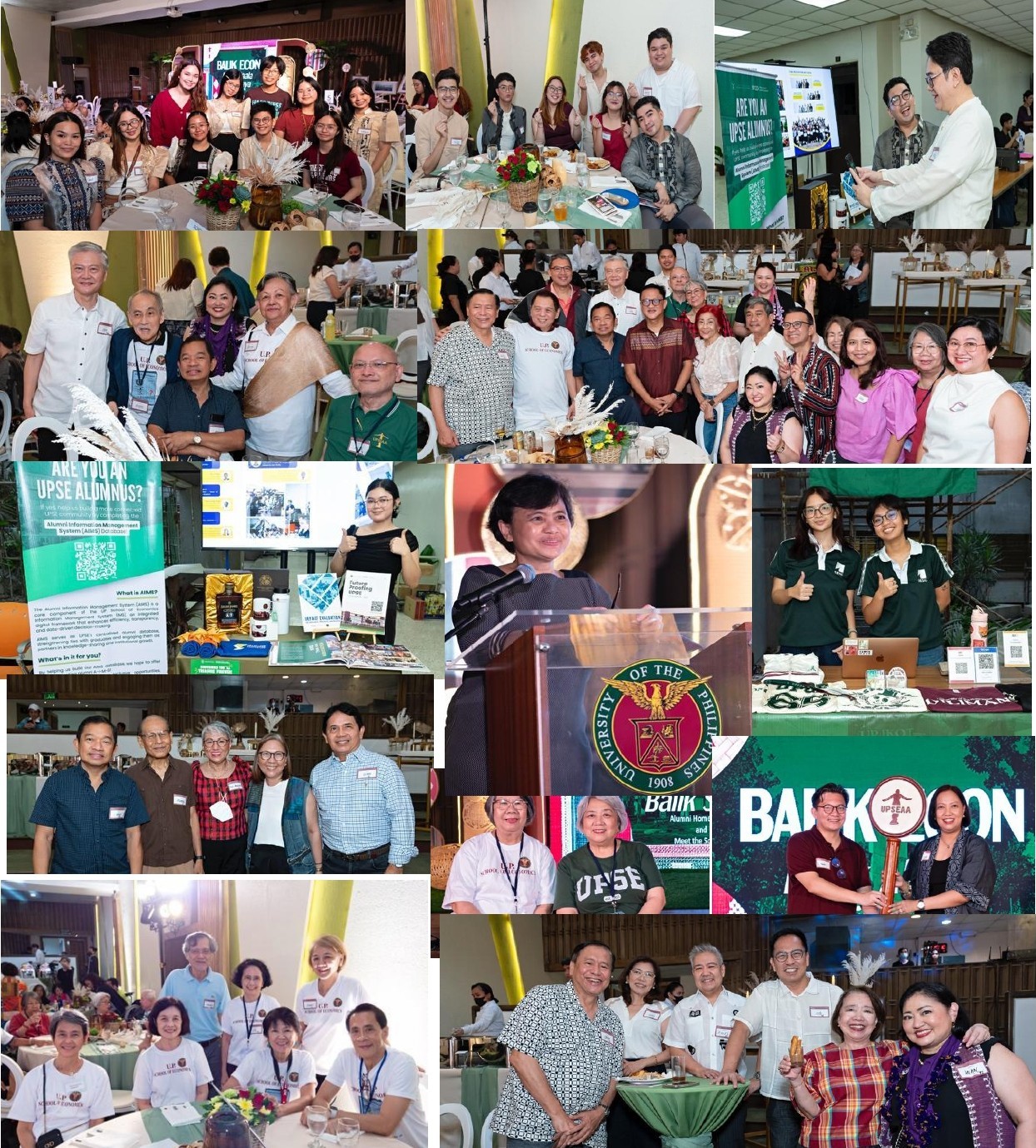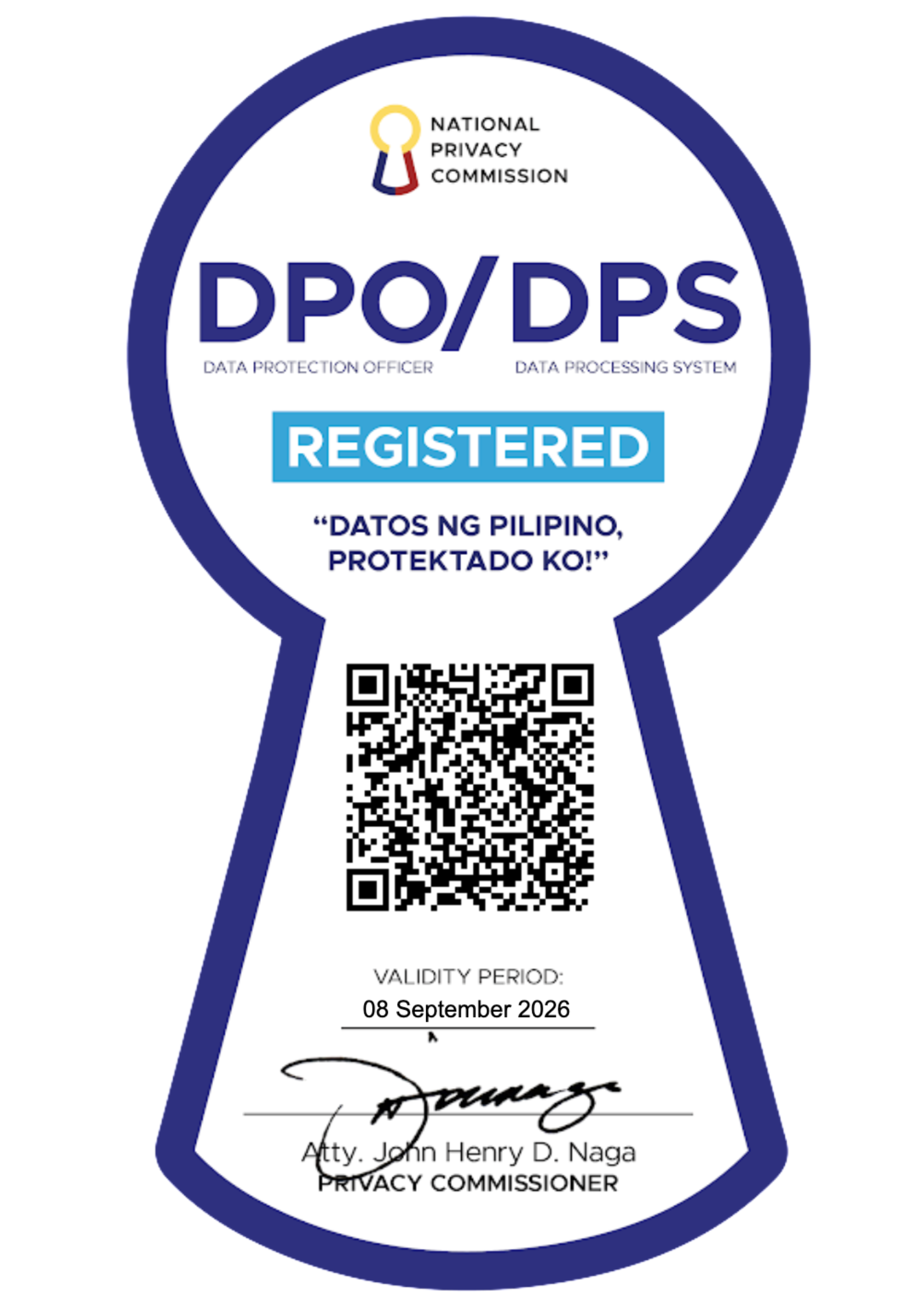The Public Affairs Office
The Public Affairs Office (PAO) of the UP School of Economics (UPSE) is its third pillar that serves as the bridge between the School and its broader community – students, alumni, partners, policymakers, and the public. The PAO is committed to promote the School’s academic initiatives, research outputs, public lectures, and training programs through strategic communication, events management, and stakeholder engagements.
Grounded in the values of service and excellence, the PAO works to strengthen the UPSE’s public presence and foster meaningful dialogue on economic and social issues. Stay connected with the UP School of Economics as PAO strives to cultivate knowledge, inspire collaboration, and forge partnerships that drive meaningful changes for the School and beyond.

The Ang Pagbabalik Class’74 atbp Collaborative Space is the first collaborative room in UPSE and made possible by the generous support of the UPSE alumni batch 1974 and other batches close to the batch.
Read More
The Program in Development Economics Reunion is an annual gathering of alumni and friends of the PDE and Master in Development Economics (MDE).
Read More
The Energy Trilemma: An Analysis of the Philippine Situation is the third forum of the Ruperto P. Alozbo Memoerial Lecture Series. The lecture series is a major project of the UPSE Program in Development Economics Association.
Read More
The Asian Shadow Financial Regulatory Committee (ASFRC) is a group of independent experts on economic policy issues relevant to financial markets and the financial industry of the Asia-Pacific region. ASFRC held their 2025 meeting in the Philippines and crafted a statement on What a second Trump presidency means for the US and Asia and presented this to the public in a forum.
Read More
Fudan University Professor, Dr. Qian Sun, held a Friday Seminar talk on A Holistic View on Deprivatization. Prof. Sun is a member of the Asian Shadow Financial Regulatory Committee. ASFRC is meeting in Manila to look into What a Trump Presidency means to the US and to the rest of the world, Asia in particular.
Read More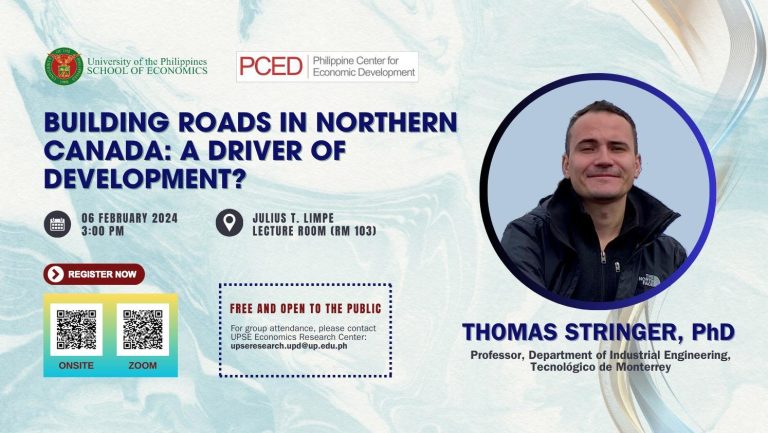
Speaker: Thomas Stringer, PhD (Professor, Department of Industrial Engineering, Tecnológico de Monterrey
Date: 6 February 2024, 3:00 pm
Abstract: The paper examines the economic effects of road connection, using Northern Canada as a case study. It will also outline some of the policy options explored for developing this region, and how infrastructure connectivity could affect remote communities in countries such as the Philippines. About the Author: Dr. Thomas Stringer is a Professor in the Department of Industrial Engineering at Tecnológico de Monterrey in Mexico. He holds a PhD in Industrial Engineering from the University of Montreal. His postdoctoral training was completed in the Department of Civil Engineering at the University of British Columbia, researching economic implications of transportation in...
Read More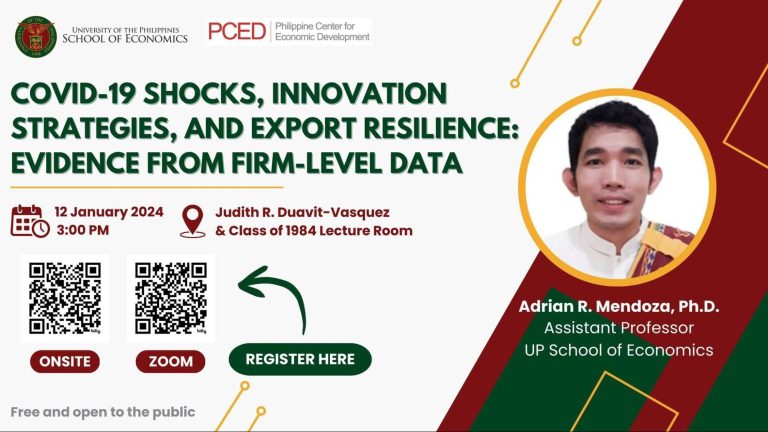
Speaker:
Adrian Mendoza, PhD (Assistant Professor, UP School of Economics)
Date: 12 January 2024, 3:00 pm
Venue:
Judith R. Duavit-Vasquez & Class of 1984 Lecture Room (Room 105)
Abstract: A large firm-level dataset that covers 23 countries was assembled from the World Bank Establishment Surveys and COVID-19 Surveys to analyze the impact of COVID-19 shocks on exporters and whether their emergency innovation responses improved business resilience, robustness, and survival during the pandemic. The empirical strategy employed logistic, Weibull, and negative binomial regressions to model exporters’ behavior amid the disruptions. The results show that despite the larger exposure to global shocks, exporters, especially those located in developed countries and connected to global value chains, had higher survival probability than non-exporters during the crisis. The regressions also confirm that in...
Read More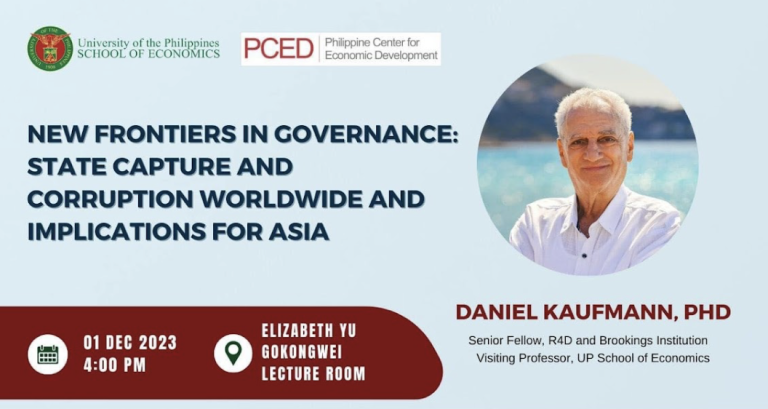
Speaker:
Maria Cielo D. Magno
Date:
06 October 2023
Time:
4:00 PM
Venue:
Judith R. Duavit-Vasquez & Class of 1984 Lecture Room
Other Details:
None
Abstract: One approach to reduce the cost of medicine is through generic drug competition. The Generics Act of 1988 (R.A. No. 6675) requires government health agencies and personnel to use generic names in purchasing, prescribing, dispensing, and administering medications. The law also requires all medical practitioners (public and private) to prescribe generic medication. We have seen an increase in generic prescribing in the Philippines. This is supported by the proliferation of generics-only drugstore chains in the country. Using IQVIA’s quarterly panel data from 2000 to 2020 of the therapeutic class statins, we examined whether the entry of branded and non-branded...
Read More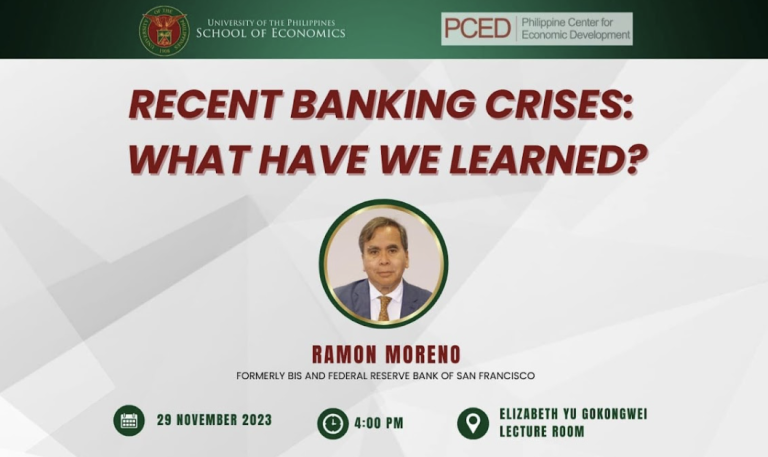
Speaker:
Ethisham Ahmad
Date:
27 June 2023
Time:
4:00 PM
Venue:
Judith R. Duavit-Vasquez & Class of 1984 Lecture Room
Other Details:
None
Abstract: The Pandemic has underlined the importance of uncertainty in modeling and policy design, which also applies to the increasing frequency and intensity of climate shocks. Policies based on static market-clearing models, popular in the BWIs, need to be reconsidered, especially considering informality, and rent-seeking, which are common in many emerging market economies. Digital transformation, including blockchain and big data, also changes the possibilities relating to policies as well as institutional design. Based on policy-based research leading to comprehensive fiscal reform in Mexico in 2013/14, and to the Chinese 14th Five-Year Plan, the Seminar will address lessons for fiscal policy choices...
Read More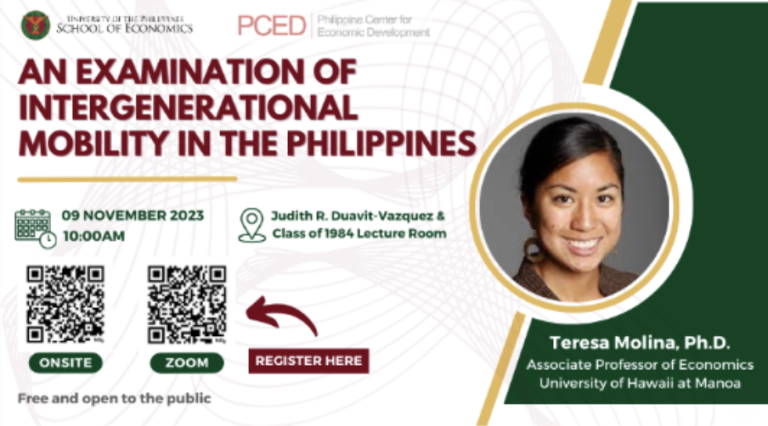
Speaker:
Marianne Juco
Date:
07 June 2023
Time:
4:00 PM
Venue:
Judith R. Duavit-Vasquez & Class of 1984 Lecture Room
Other Details:
None
Abstract This dissertation studies and measures the extent of family relations between Philippine businesses and government, and provides the quantitative evidence for the rich anecdotal literature on Philippine politicians and their firms. We hypothesize a family-based definition of political connections and delineate two types of political connections according to motive: firms with politics-to-business connections motivated by political goals, and firms with business-to-politics connections motivated by profits. Using a sample of 18,000 Philippine corporations, we identify politically connected corporations. We establish stylized facts for these politically connected firms, illustrate the pervasiveness of these connections across regions and industries, and estimate the size of the economy...
Read More
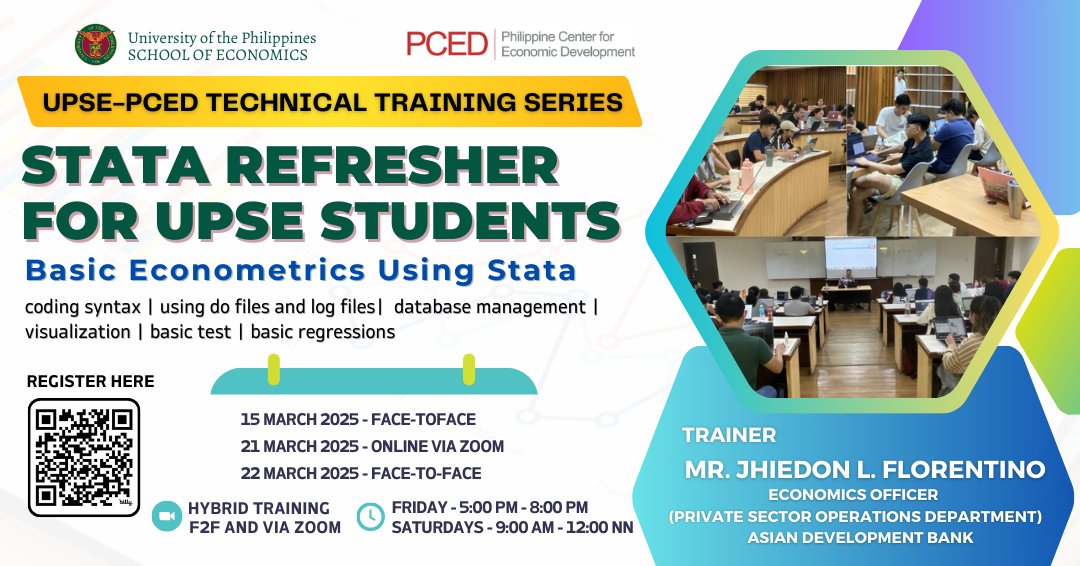
Training details:
Stata Refresher for UPSE Students
Facilitator/s:
Mr. Jhiedon L. Florentino
Date/s:
March 15, 21, & 22, 2025
Time:
9:00 AM - 12:00 NN (Saturdays) | 5:00 PM - 8:00 PM (Friday)
Venue:
RM. 105 Judith R. Duavit-Vasquez & Class of 1984 Lecture Room, UPSE Encarnacion Hall.
Other Details:
None
This is a hybrid training; Participants are expected to attend 𝙖𝙡𝙡 𝙨𝙚𝙨𝙨𝙞𝙤𝙣𝙨. Priority will be given to Students in advanced economics and econometrics courses and thesis writers (Econ 199, Econ 138, Econ 233, Econ 298, DE 253 & DE 292). Limited slots only. Other students and non-UPSE students may be accommodated depending on the available slots.
Read More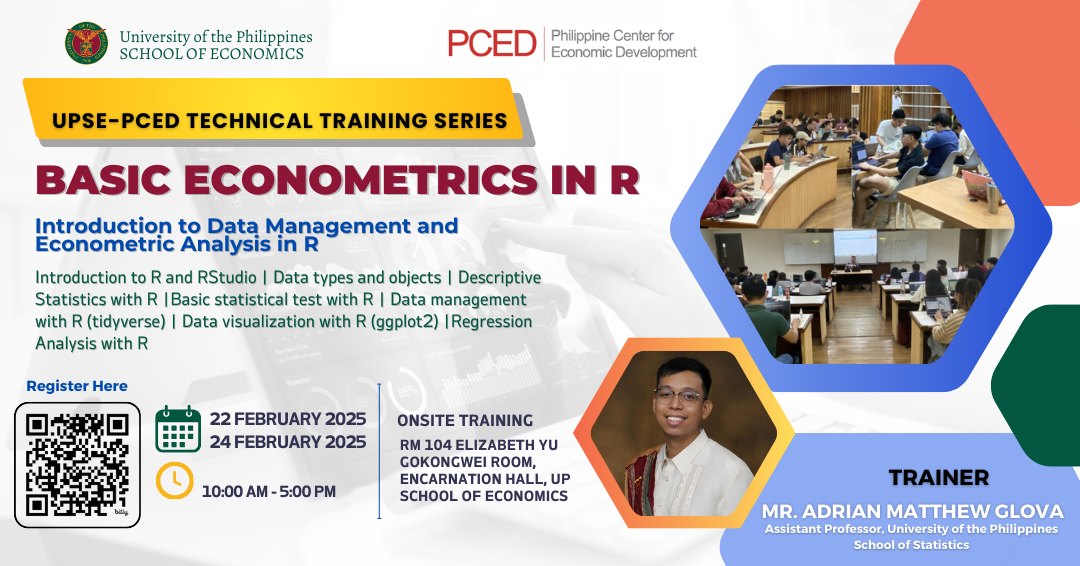
Training details:
Basic Econometrics in R
Facilitator/s:
Prof. Adrian Matthew Glova
Date/s:
February 22 & 24, 2025
Time:
10:00 AM - 5:00 PM
Venue:
RM 114 Elizabeth Yu Gokongwei Lecture Room, UPSE Encarnacion Hall.
Other Details:
None
This is an onsite training; Participants are expected to attend all sessions. Priority will be given to new econometrics students (e.g., Econ 131 & Econ 132) and new graduate students. Limited slots only. Other students and non-UPSE students may be accommodated depending on the available slots.
Read More
Training details:
Stata II (Basic Econometrics Using Stata)
Facilitator/s:
Ms. Marife Lou L. Bacate
Date/s:
November 11, 18, & 25, 2024
Time:
9:00 AM - 12:00 NN
Venue:
RM. 105 Judith R. Duavit-Vasquez & Class of 1984 Lecture Room, UPSE Encarnacion Hall
Other Details:
None
This is a hybrid training; Participants are expected to attend all sessions. Priority will be given to students in advanced econometrics courses and thesis writers (Econ 199, Econ 299, Econ 300, Econ 400). Limited slots only. Other students and non-UPSE students may be accommodated depending on the available slots.
Read More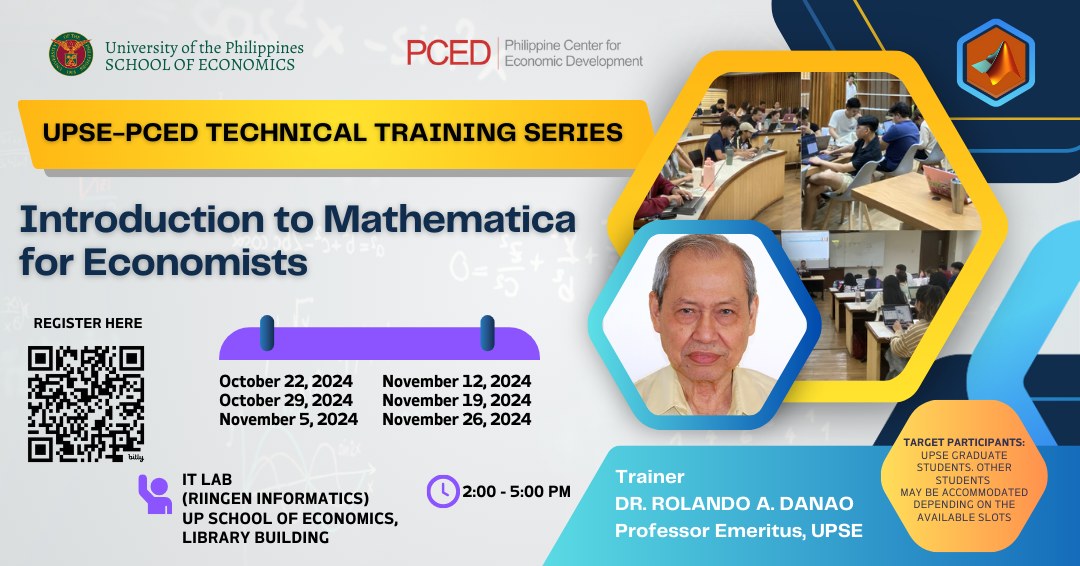
Training details:
Introduction to Mathematica for Economists
Facilitator/s:
Rolando A. Danao, PhD
Date/s:
October 22, 29, 2024 | November 5, 12, 19 and 26, 2024
Time:
2:00 PM - 5:00 PM
Venue:
UP School of Economics, Library Building, IT Lab (Riingen Informatics)
Other Details:
None
This is an onsite training; Participants are expected to attend all face-to-face sessions. Priority will be given to UPSE graduate students, limited slots only. Non-UPSE students may be accommodated depending on the available slots. Participants are expected to have already installed Mathematica (c/o the UP Institute of Mathematics).
Read More
Training details:
R for Beginners
Facilitator/s:
Mr. Thadeus Alvirey S. Tayona
Date/s:
October 12, 14, 19, 21, 26, 28, 2024
Time:
1:00 PM - 5:00 PM
Venue:
RM. 105 Judith R. Duavit-Vasquez & Class of 1984 Lecture Room, UPSE Encarnacion Hall.
Other Details:
None
This is a hybrid training; Participants are expected to attend all sessions. Priority will be given to new econometrics students (e.g., Econ 131) and new graduate students. Limited slots only. Other students and non-UPSE students may be accommodated depending on the available slots.
Read More
Training details:
Stata I (Introduction to Stata)
Facilitator/s:
Ms. Marife Lou L. Bacate
Date/s:
September 30, 2024 | October 7 & 14, 2024
Time:
9:00 AM - 12:00 NN
Venue:
RM. 105 Judith R. Duavit-Vasquez & Class of 1984 Lecture Room, UPSE Encarnacion Hall.
Other Details:
None
This is a hybrid training; Participants are expected to attend all sessions. Priority will be given to new econometrics students (e.g., Econ 131, Econ 231, DE 231) and new graduate students. Limited slots only. Other students and non-UPSE students may be accommodated depending on the available slots.
Read More
Training details:
Stata II (Basic Econometrics Using Stata)
Facilitator/s:
Ms. Marife Lou L. Bacate
Date/s:
April 22, 26, & 29, 2024
Time:
9:00 AM - 12:00 NN
Venue:
Virtual via Zoom
Other Details:
None
This is an online training; Participants are expected to attend all sessions. Priority will be given to students in advanced econometrics courses and thesis writers (Econ 199, Econ 299, Econ 300, Econ 400). Limited slots only. Other students and non-UPSE students may be accommodated depending on the available slots.
Read More
Training details:
R for Beginners
Facilitator/s:
Prof. Adrian Matthew Glova
Date/s:
April 13, 20, 27, 2024 | May 4, & 11, 2024
Time:
10:00 AM - 3:00 PM
Venue:
Rm 114 Elizabeth Yu Gokongwei Lecture Room, UPSE Encarnacion Hall
Other Details:
None
This is an onsite training; Participants are expected to attend all sessions. Priority will be given to new econometrics students (e.g., Econ 131 & Econ 132) and new graduate students. Limited slots only. Other students and non-UPSE students may be accommodated depending on the available slots.
Read More
Training details:
Stata I (Introduction to Stata)
Facilitator/s:
Ms. Marife Lou L. Bacate
Date/s:
April 8, 12, & 15, 2024
Time:
9:00 AM - 12:00 NN
Venue:
Virtual via Zoom
Other Details:
None
This is an online training; Participants are expected to attend all sessions. Priority will be given to new econometrics students (e.g., Econ 131) and new graduate students. Limited slots only. Other students and non-UPSE students may be accommodated depending on the available slots.
Read More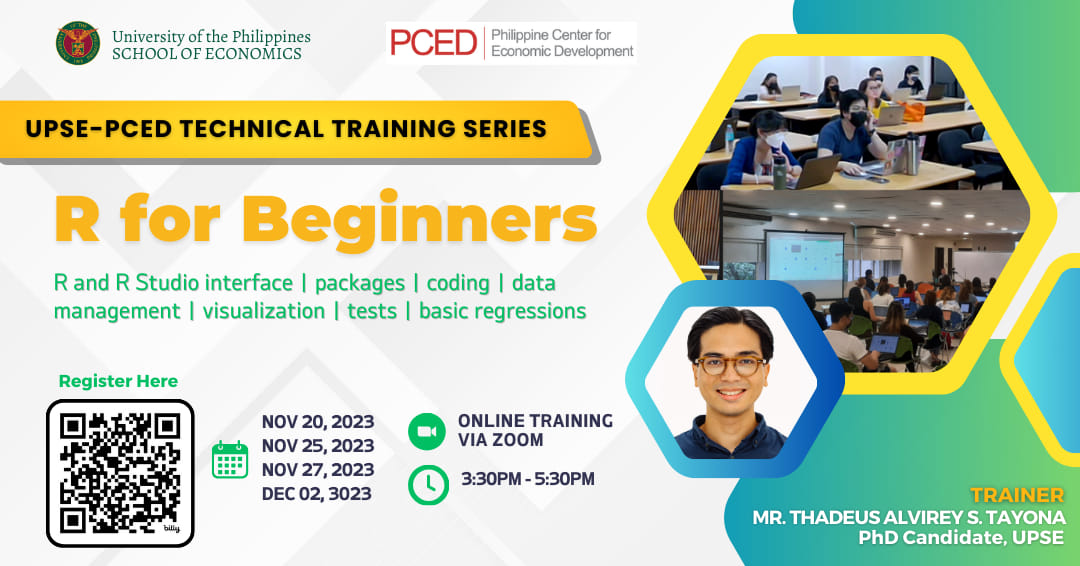
Training details:
R for Beginners
Facilitator/s:
Mr. Thadeus Alvirey S. Tayona
Date/s:
November 20, 25 & 27 | December 2, 2023
Time:
1:00 PM - 5:00 PM
Venue:
Virtual via Zoom
Other Details:
None
This is a 16-hour course. Participants are expected to attend all sessions. Students currently enrolled or are planning to enroll in Econ 132 are highly encouraged to join.Limited slots only. Non-UPSE students may be accommodated depending on the available slots
Read More
Training details:
Stata II (Basic Econometrics Using Stata)
Facilitator/s:
Ms. Marife Lou L. Bacate
Date/s:
October 21 & 28, 2023
Time:
11:30 PM – 2:30 PM (AM session) and 3:30 PM – 5:30 (PM session)
Venue:
Virtual via Zoom
Other Details:
None
This is an online training; Participants are expected to attend both sessions (AM & PM sessions). Priority will be given to students in advanced econometrics courses and thesis writers (Econ 199, Econ 300 and Econ 400). Others will be accommodated depending on the available slots.
Read More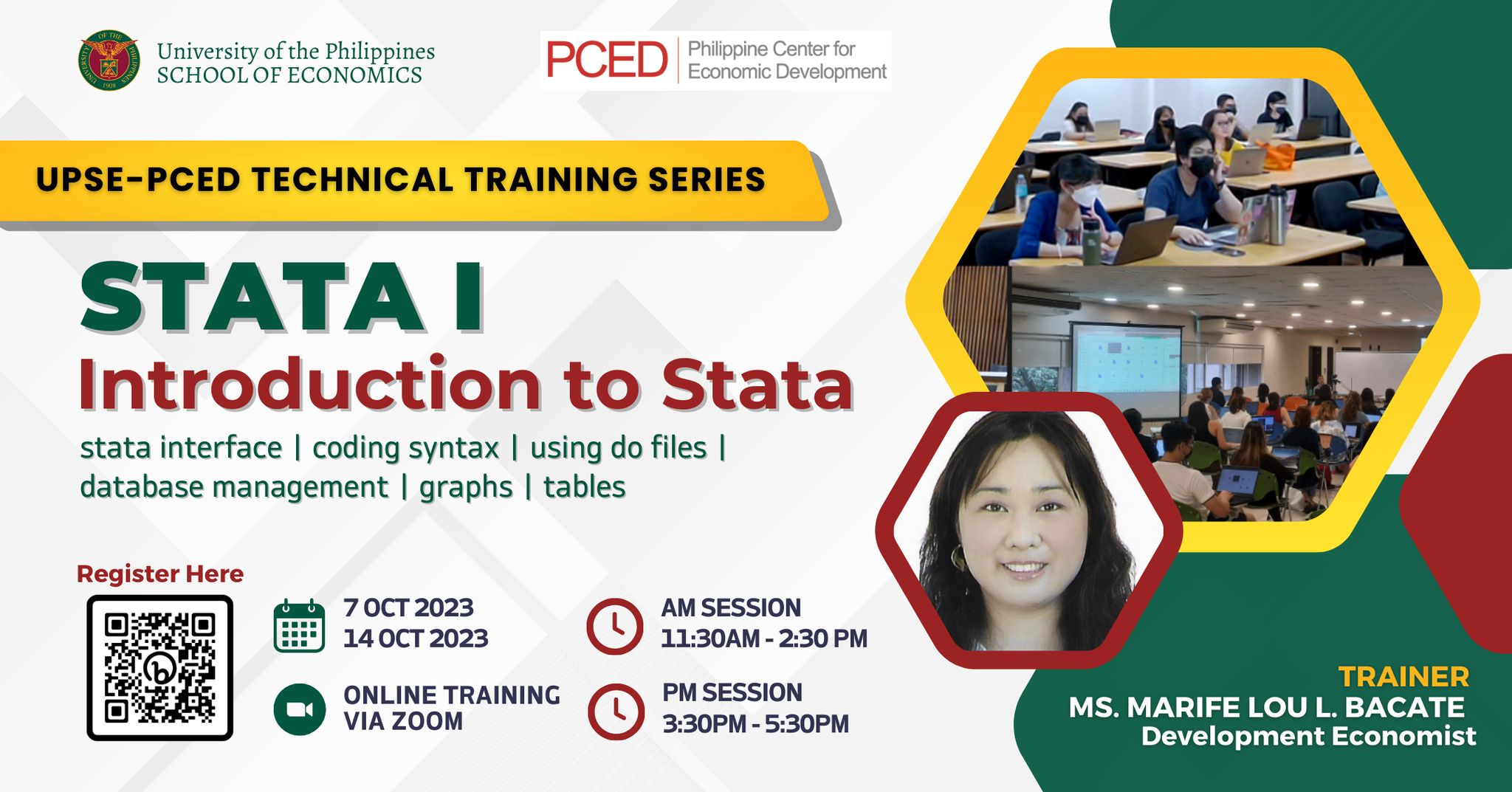
Training details:
Stata I (Introduction to Stata)
Facilitator/s:
Ms. Marife Lou L. Bacate
Date/s:
October 7 & 14, 2023
Time:
11:30 PM – 2:30 PM (AM session) and 3:30 PM – 5:30 (PM session)
Venue:
Virtual via Zoom
Other Details:
None
This is an online training; Participants are expected to attend both sessions (AM & PM sessions). Priority will be given to new economics students (Econ 131 and Econ 231) and new UPSE graduate students. Others will be accommodated depending on the available slots.
Read More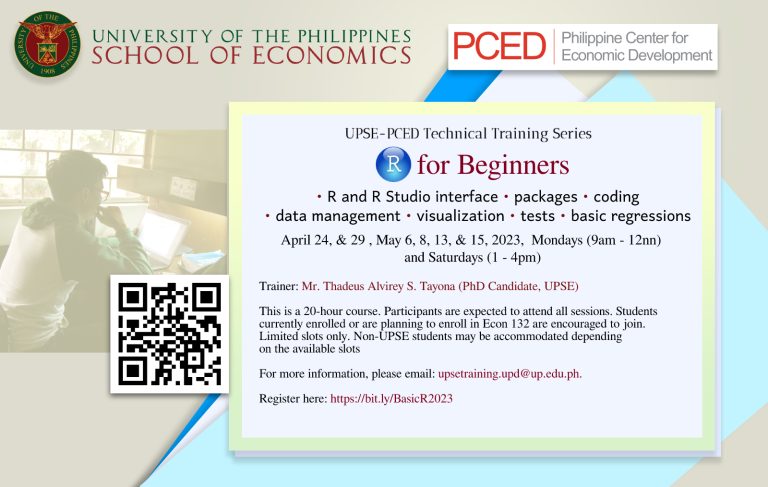
Training details:
R for Beginners
Facilitator/s:
Mr. Thadeus Alvirey S. Tayona
Date/s:
April 24 & 29, 2023 | May 6, 18, 13 & 15, 2023
Time:
9:00 AM – 12:00 NN (Mondays) | 1:00 – 4:00 PM (Saturdays)
Venue:
Virtual via Zoom
This is a 20-hour course. Participants are expected to attend all sessions. Students currently enrolled or are planning to enroll in Econ 132 are encouraged to join. Limited slots only. Non-UPSE students may be accommodated depending on the available slots
Read More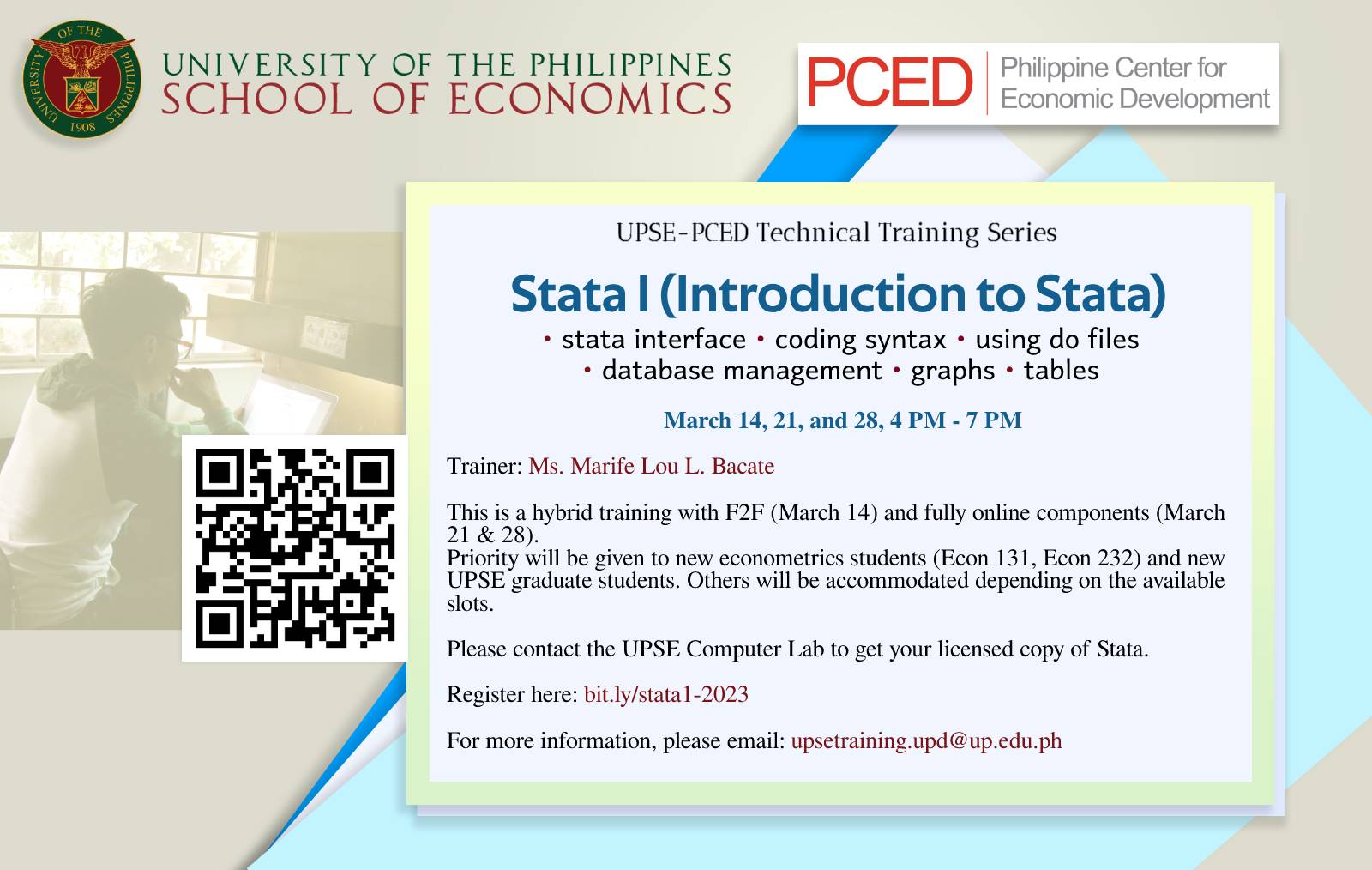
Training details:
Stata I (Introduction to Stata)
Facilitator/s:
Ms. Marife Lou L. Bacate
Date/s:
March 14, 21 and 28, 2023
Time:
4:00 PM - 7:00 PM
Venue:
RM 127 (Sergio & Beatriz Ordoñez lecture room), Encarnacion Building
Other Details:
None
This is a hybrid training with F2F (March 14) and fully online components (March 21 & 28).Priority will be given to new econometrics students (Econ 131, Econ 232) and new UPSE graduate students. Others will be accommodated depending on the available slots.
Read More
Training details:
Stata II (Basic Econometrics Using Stata)
Facilitator/s:
Ms. Marife Lou L. Bacate
Date/s:
March 13, 20, and 27, 2023
Time:
9:00 AM - 12:00 NN
Venue:
RM 127 (Sergio & Beatriz Ordoñez lecture room), Encarnacion Building
Other Details:
None
This is a hybrid training with F2F (March 13) and fully online components (March 20 & 27). Priority will be given to students in higher econometrics courses (Econ 132, Econ 138, Econ 232, Econ 233), thesis writers, and students in advanced graduate courses (Econ 241, Econ 298, DE 253, DE 292). Others will be accommodated depending on the available slots.
Read More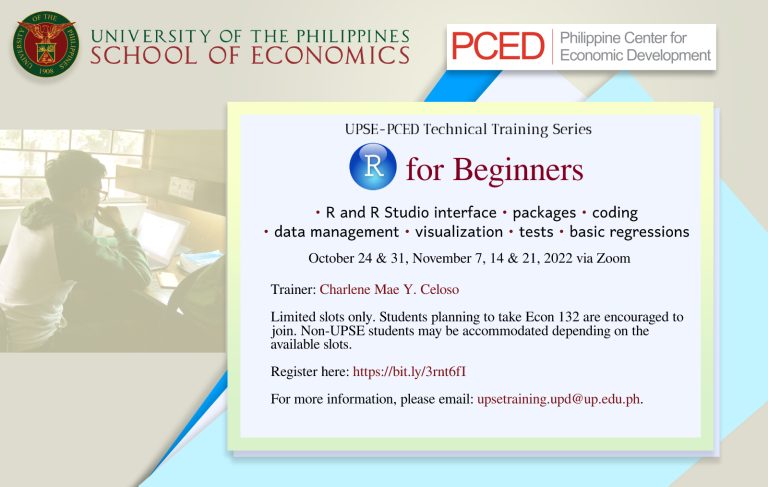
Training details:
R for Beginners
Facilitator/s:
Ms. Charlene Mae Y. Celoso
Date/s:
October 24 & 31, 2022 | November 7, 14, & 21, 2022
Time:
Venue:
Virtual via Zoom
Other Details:
None
Limited slots only. Students planning to take Econ 132 are encouraged to join. Non-UPSE students may be accommodated depending on the available slots.
Read More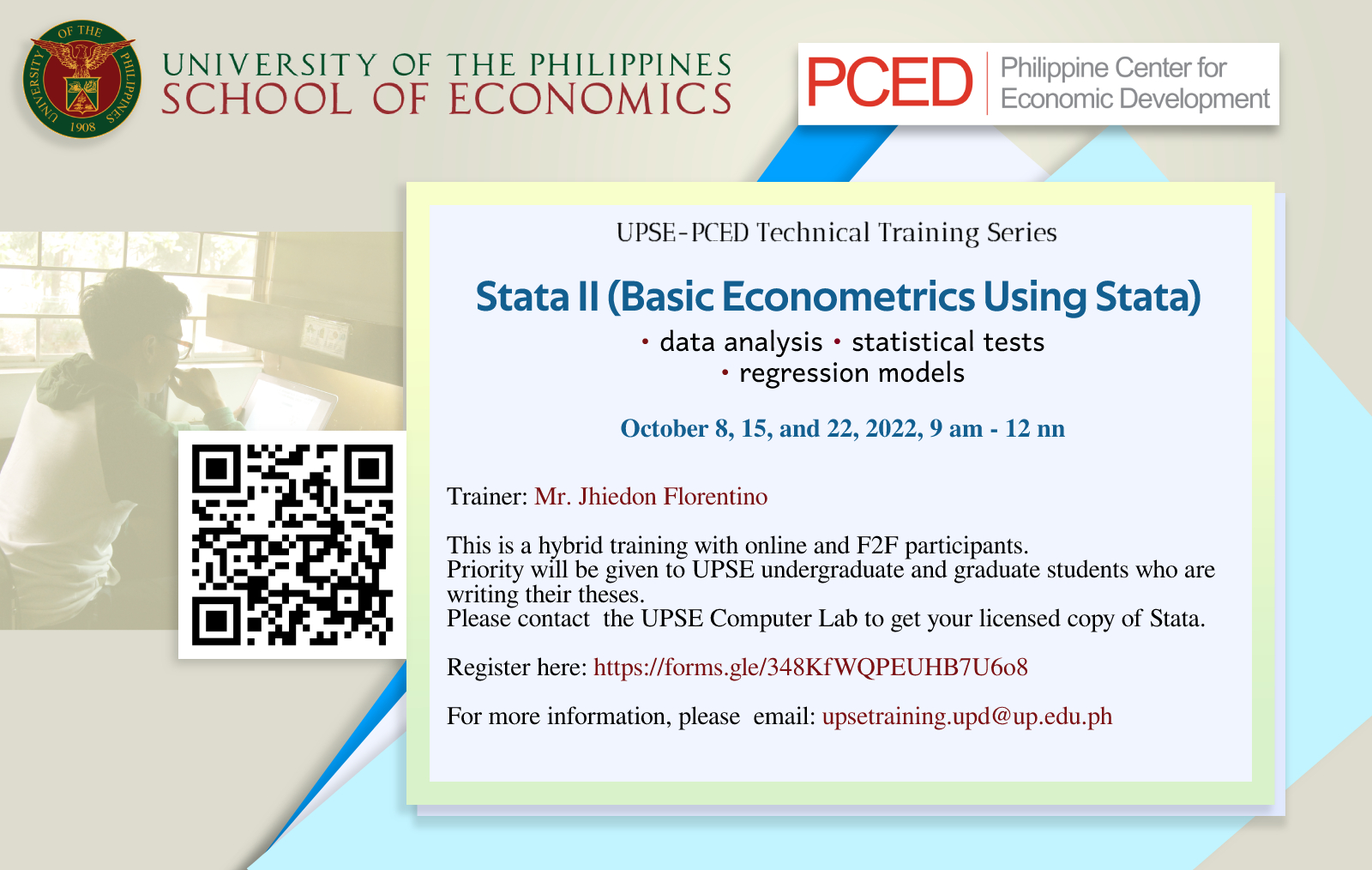
Training details:
Stata II (Basic Econometrics Using Stata)
Facilitator/s:
Mr. Jhiedon Florentino
Date/s:
October 8, 15 and 22, 2022
Time:
9:00 AM - 12:00 NN
Venue:
CMFE Lobby 3rd Floor UPSE Library Building
Other details:
None
This is a hybrid training with online and F2F participants. Priority will be given to UPSE undergraduate and graduate students who are writing their theses.
Read More
Training details:
Stata I (Introduction to Stata)
Facilitator/s:
Mr. Jhiedon Florentino
Date/s:
September 17, 24, | October 1, 2022
Time:
9:00 AM - 12:00 NN
Venue:
CMFE Lobby 3rd Floor UPSE Library Building
This is a hybrid training with online and F2F participants. Priority will be given to Econ 131 and new graduate students.
Read More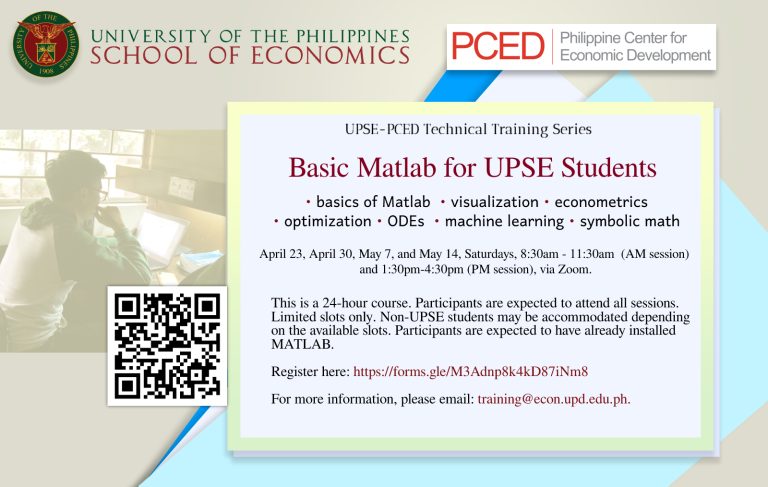
Training details:
Basic Matlab for UPSE Students
Facilitator/s:
Dr. Gino Angelo Velasco
Date/s:
April 23 & 30, 2022 | May 7 & 14, 2022
Time:
8:30 – 11:30 AM (AM Session) | 1:30 – 4:30 PM (PM Session)
Venue:
Virtual via Zoom
Other Details:
None
This 24-hour course, segmented into four sessions, familiarized the participants with the basics of Matlab, visualization, econometrics, optimization, ODEs, machine learning, and symbolic math.
Read More
Training details:
Workshop on Experimental Economics
Facilitator/s:
Benjamin E. Radoc, Jr., PhD
Date/s:
April 18-29, 2022
Time:
6:00 – 8:00 PM
Venue: Other Details: None Events Extensions Alumni UPSE in the News
Read More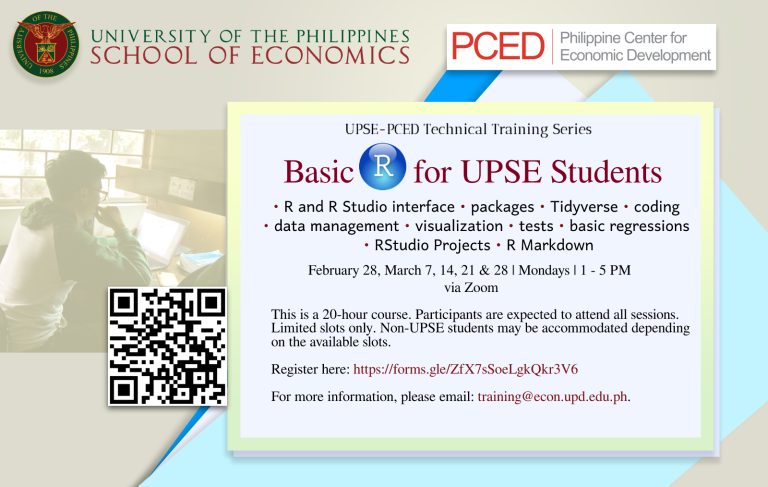
Training details:
Basic R for UPSE Students
Facilitator/s:
Mr. Thadeus Alvirey S. Tayona
Date/s:
February 28, 2022 | March 7, 14, 21 & 28, 2022
Time:
1:00 – 5:00 PM
Venue:
Virtual via Zoom
Other Details:
None
This 20-hour course, segmented into five (5) sessions, familiarized the participants with the R and R Studio interface, packages, Tidyverse, coding, data management, visualization, tests, basic regressions, RStudio Projects, and R Markdown.
Read More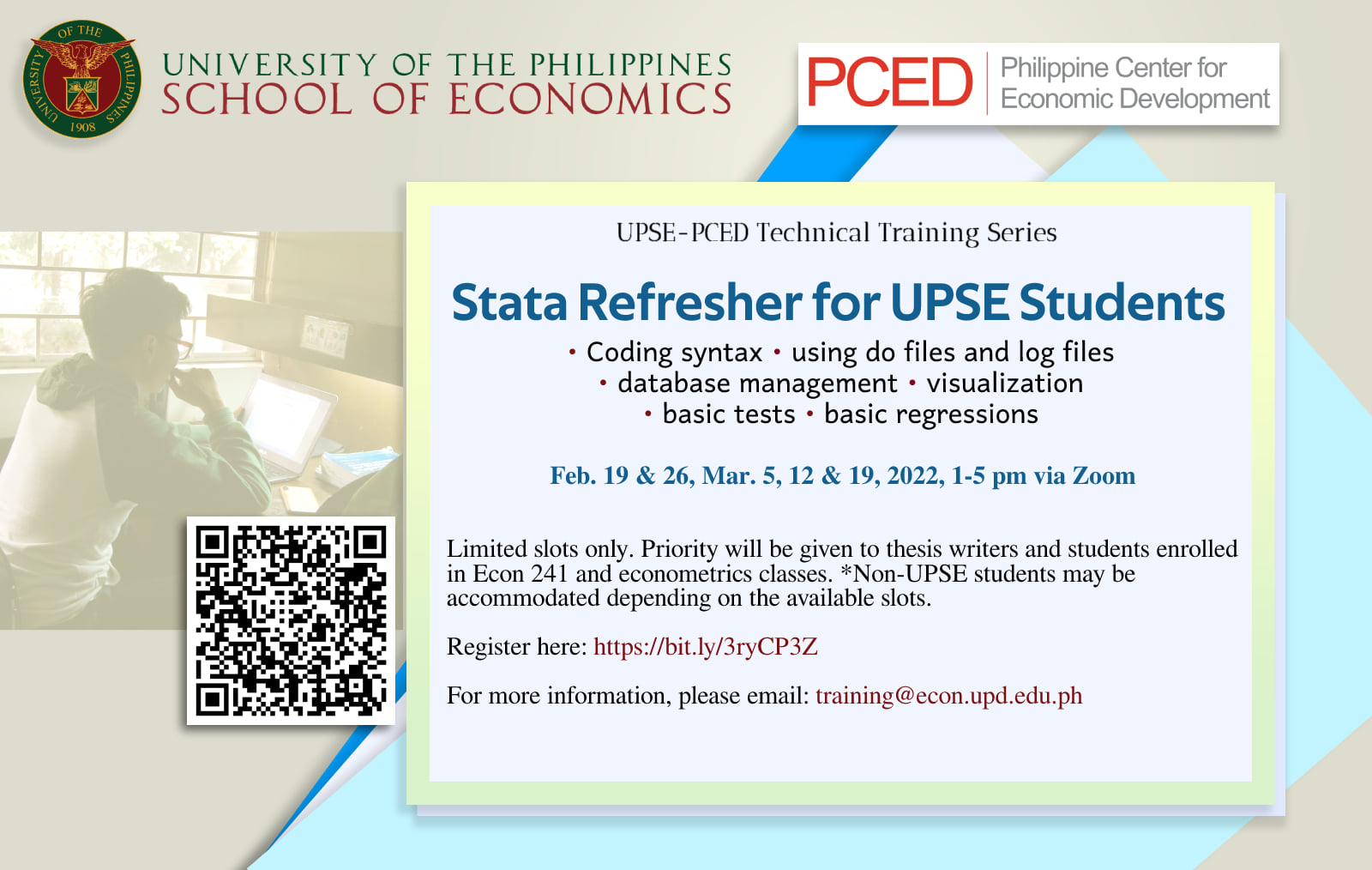
Training details:
Facilitator/s:
Ms. Irene Jo Arzadon
Date/s:
February 19 & 26 | Mar. 5, 12 & 19, 2022
Time:
1:00 – 5:00 PM
Venue:
Virtual via Zoom
Other Details:
None
Limited slots only. Priority will be given to thesis writers and students enrolled in Econ 241 and econometrics classes. *Non-UPSE students may be accommodated depending on the available slots.
Read More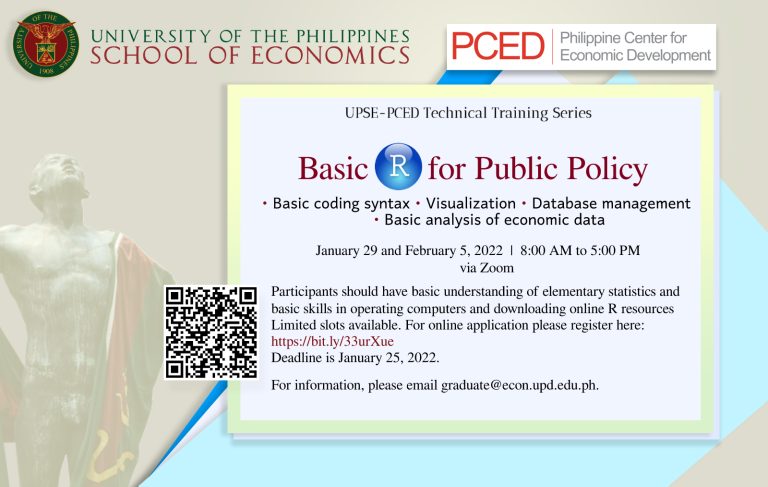
Training details:
Basic R for Public Policy
Facilitator/s:
Ms. Charlene Mae Y. Celoso
Date/s:
January 29, 2022 | February 5, 2022
Time:
8:00 AM – 5:00 PM
Venue:
Virtual via Zoom
Other Details:
None
Two training sessions covering Basic R for Public Policy took place on January 29 and February 5, 2022. During these sessions, participants received instruction on fundamental coding syntax, visualization techniques, database management, and basic analysis of economic data.
Read More
Introduction to the UPSEAA
 One of the most important partners of the UP School of Economics (UPSE) is its alumni and UPSE has cultivated a strong relationship with the UPSE Alumni Association (UPSEAA).
One of the most important partners of the UP School of Economics (UPSE) is its alumni and UPSE has cultivated a strong relationship with the UPSE Alumni Association (UPSEAA).
The UP School of Economics Alumni Association (UPSEAA) was established in 1985 and its mission is to partner with alumni in their professional and social development and provide the support the UP School of Economics (UPSE) needs in attaining academic supremacy. To achieve this, UPSEAA is uniting a diverse and dynamic community of former students who share a common DNA developed through their academic trainings and experiences at UPSE. This organization is dedicated to fostering lifelong connections, supporting professional growth, and celebrating the remarkable achievements of our alumni.
Some major projects of UPSEAA directly benefits the students of UPSE. There are three programs, namely: 1) The UPSEAA Scholarships Program, 2) The Computer Banking Program, and 3) The Data Allowance Program. The immediate objectives are to assist students cope with personal financial constraints during their stay in the UPSE, and to attract students of exceptional academic promise to the School of Economics. The ultimate objective is to assist the UPSE in producing a growing number of world-class professional economists or economics-savvy leaders in other professions – all of whom could play key roles in the country’s development in the long run.
Photo was taken after the oathtaking of the 2025 BoT of UPSEAA.
UP President Angelo Jimenez led the swearing in at the Executive House.

To join, UPSE alumni may visit: upseaa.official@gmail.com Everyone is invited to visit the website (upseaa.official@gmail.com) or stay updated with the latest news, events, and activities of the UPSEAA by following their social media pages:
- Facebook: UP School of Economics Alumni Association
● Instagram: @UPSEAA
● Viber Community: UPSEAA Community
Balik Econ, Balik Alaala, Balik Saya: A Powerful Reaffirmation of UPSE’s Enduring Legacy and Alumni Commitment
The University of the Philippines School of Economics Alumni Association (UPSEAA) successfully convened alumni across all generations for its annual Homecoming on November 15, 2025, held at the UP School of Economics Auditorium. More than a simple reunion, the event served as a powerful testament to the school’s enduring culture of mentorship and solidarity.
The evening commenced with an intimate meet-and-greet between UPSE scholars and their Ang Pagbabalik (Batch 74 Atbp) benefactors. This purposeful exchange enabled sponsors to connect personally with the students whose academic careers they passionately support, setting a warm and meaningful tone for the evening.
The pre-program atmosphere was one of lively engagement. Attendees were greeted by roving photographers, interactive organization booths, and a chance to claim their new UPSEAA IDs and exclusive, customized Beep cards. Near the entrance, a designated voting booth allowed alumni to actively participate in the governance of the association by casting their ballots for the new UPSEAA Board of Trustees. The festive environment was enhanced by gourmet food carts, a Diageo-sponsored mobile bar, and curated art exhibits by Galerie Joaquin and ArtPrints Philippines, with proceeds directly supporting the Batch 2000 fundraising initiative.
The formal program commenced with a heartfelt recognition of the jubilarians: Batch ’75 celebrating their Golden Jubilee and Batch 2000 marking their Silver Anniversary. After a captivating dinner performance by Helena and dynamic audio-visual presentations showcasing the activities of student organizations (SESC, Ecosoc, and OBEM), the focus shifted to institutional achievements.
UPSEAA President Mian Alentajan delivered the Annual President’s Report, detailing significant milestones in alumni engagement and the expansion of the scholarship program. The Guest of Honor, UP President Angelo A. Jimenez, then took the stage to underscore the School’s profound influence on national economic policy and its role in forging public service leaders.
Perhaps the most resonant segment of the night was the presentation of UPSE scholars, a moving acknowledgment of their academic excellence and the transformative impact of the alumni-funded support. The program continued with presentations from the jubilarian batches, culminating in the ceremonial turnover of Batch 2000’s donation to UPSE and the symbolic passing of the torch to the next celebrating batches, ’76 and 2001.
The night concluded with group photographs, a lively rockaoke session, and jubilant dancing, transforming the auditorium into a space for celebration and shared nostalgia. The 2025 Homecoming was a powerful reaffirmation of UPSE’s enduring legacy of academic distinction, commitment to community, and robust alumni participation.
UPSEAA Job Fair

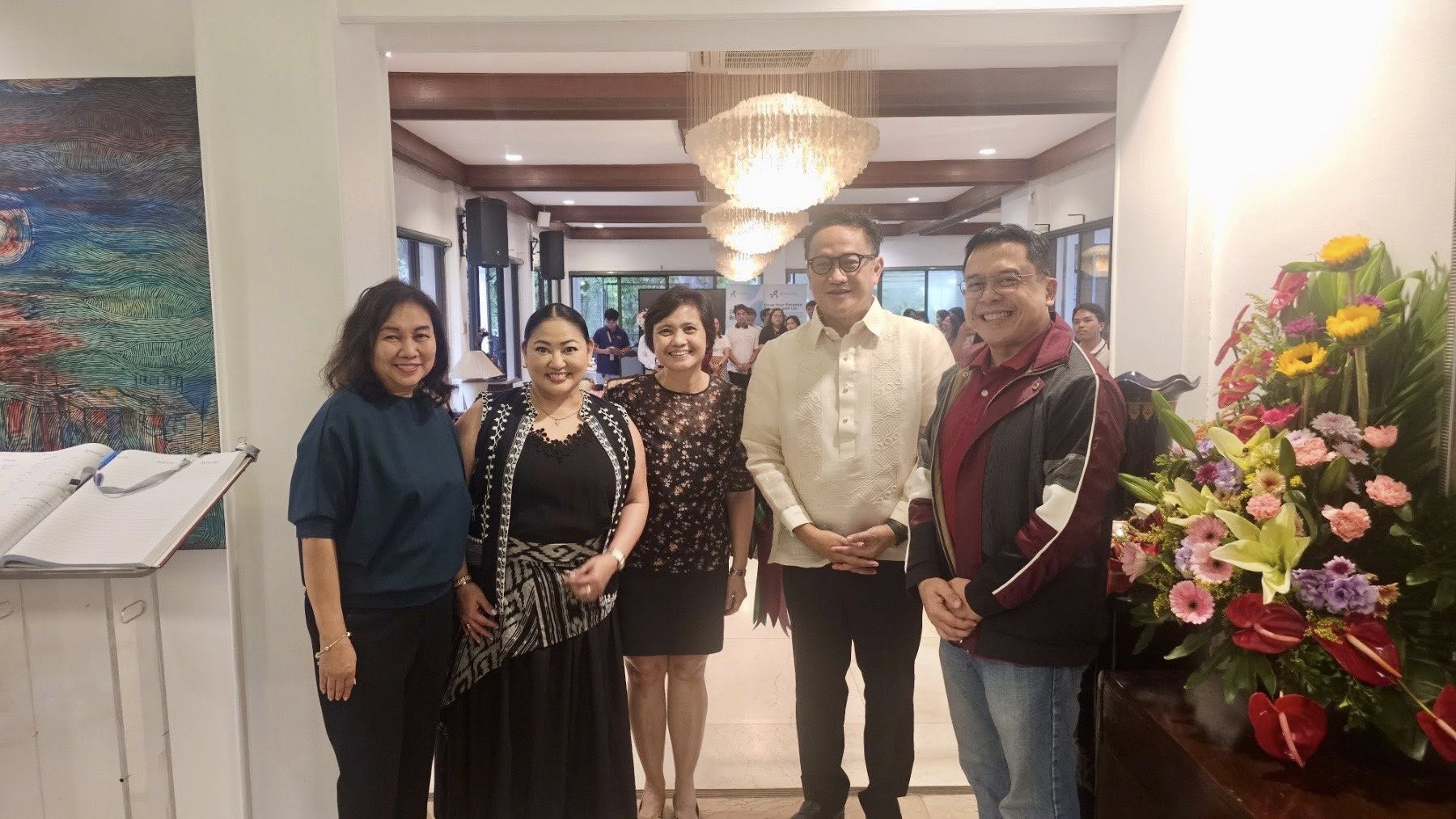
The U.P. School of Economics Alumni Association in collaboration with UP School of Economics Student Council and Alliance of School of Economics Organizations proudly introduces the companies featured for the UPSE Job Fair 2025: Economists for the Future held last July 5, 2025 at UP Executive House.
US or China? Asian economies may have to pick a side
By: Ian Nicolas P. Cigaral – Reporter / @IanCigaral Philippine Daily Inquirer / 02:02 AM January 14, 2025
Link to the original article: https://business.inquirer.net/501150/us-or-china-asian-economies-may-have-to-pick-a-side
Asian economies like the Philippines might benefit from aligning their trade policies with either the United States or China amid President-elect Donald Trump’s tariff threats, highlighting the difficulty in forming a united Asean (Association of Southeast Asian Nations) response to heightened trade protectionism.
At a forum organized by the Asian Shadow Financial Regulatory Committee (ASFR), Maria Socorro Gochoco-Bautista, economist at the University of the Philippines, said the “dissimilar” impact of Trump’s policies on Asian economies means there would be winners and losers in the event of a global trade war.
ASFR is a group of independent experts on economic policy issues relevant to the Asia-Pacific region.

